|
|
|
Sort Order |
|
|
|
Items / Page
|
|
|
|
|
|
|
| Srl | Item |
| 1 |
ID:
127189
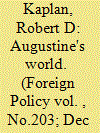

|
|
|
| 2 |
ID:
144585
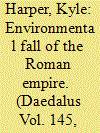

|
|
|
|
|
| Summary/Abstract |
Global environmental history is currently being enriched by troves of new data, and new models of environmental variability and human impact. Earth scientists are rapidly expanding historians’ knowledge of the paleoclimate through the recovery and analysis of climate proxies such as ice cores, tree rings, stalagmites, and marine and lake sediments. Further, archaeologists and anthropologists are using novel techniques and methods to study the history of health and disease, as revealed through examination of bones and paleomolecular evidence. These possibilities open the way for historians to participate in a conversation about the long history of environmental change and human response. This essay considers how one of the most classic of all historical questions–the fall of the Roman Empire–can receive an answer enriched by new knowledge about the role of environmental change.
|
|
|
|
|
|
|
|
|
|
|
|
|
|
|
|
| 3 |
ID:
131050
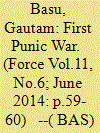

|
|
|
|
|
| Publication |
2014.
|
| Summary/Abstract |
The two leading Mediterranean powers in the post-Greek world clashed in three Punic Wars in the first of which Rome, now master of all Italy, overran Sicily, reinvented itself as a naval power and took its armies beyond Europe for the first time to Carthage in Africa
By the mid-3rd century BC, Romans had secured the whole of the Italian peninsula defeating in about 100 years every rival on mainland Italy. First the Latin League dissolved in the Latin War, then the Samnites were subjugated in three Samnite wars, and finally the cities of Magna Grecia submitted to Rome after Pyrrhus of Epirus withdrew (see FORCE May 2014). Barely decades after the last Pyrrhic War, Rome fought outside Italy for the first time. The First Punic War (264-241 BC) was the first of three fought between Carthage and the Roman Republic for supremacy in the western Mediterranean Sea. It was localised on the island of Sicily but Roman legions also landed on African soil. Carthage, located in today's Libya and Tunisia, was the world's leading naval power at that time. These wars were called 'Punic' from the Latin name for Carthaginians - 'Punici' derived from 'Phoenici' - who traced their origins to the Semitic-speaking peoples of North Africa descending from Phoenician traders of modern Lebanon and who spoke the Punic language. The Second Punic War (218-201 BC) is most remembered in military history for Hannibal's great crossing of the Alps with elephants to do what no man did before: attack Rome overland from the north. The Third Punic War (149-146 BC) involved an extended siege of Carthage, culminating in its conquest by Rome, ending the tale of one of the most illustrious military rivalries in history.
|
|
|
|
|
|
|
|
|
|
|
|
|
|
|
|
| 4 |
ID:
122397
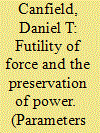

|
|
|
|
|
| Publication |
2012.
|
| Summary/Abstract |
I
n the spring of 1763 Great Britain, basking in the warm afterglow of decisive
victory in the Seven Years War, presided over a vast and unprecedented
global empire. The small island nation seemingly, and rather suddenly, found
itself without peer-enjoying a level of military and political hegemony not
seen since the days of the Roman Empire.2
It was a unique, albeit fleeting,
position. In the span of a mere twenty years, the world's preeminent global
power, despite enjoying a considerable advantage in almost every conceivable category used to calculate military potential, found itself disgraced and
defeated by a start-up nation possessing a markedly inferior conventional military capability. Crippled by a grossly burgeoning national debt, diplomatically
isolated, and politically divided at home, the North Ministry became embroiled
in a protracted and unpopular global war that its policymakers and military
leaders seemed incapable of understanding-much less winning-until it was
far too late.3
|
|
|
|
|
|
|
|
|
|
|
|
|
|
|
|
| 5 |
ID:
147873
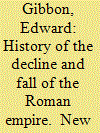

|
|
|
|
|
| Publication |
New Delhi, Alpha Editions, 2016.
|
| Description |
720p.hbk
|
| Contents |
Vol. I - VI (Available)
|
| Standard Number |
9789386019233
|
|
|
|
|
|
|
|
|
|
|
|
Copies: C:1/I:0,R:1,Q:0
Circulation
| Accession# | Call# | Current Location | Status | Policy | Location |
| 058834 | 937.06/GIB 058834 | Main | On Shelf | Reference books | |
|
|
|
|
| 6 |
ID:
147878
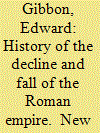

|
|
|
|
|
| Publication |
New Delhi, Alpha Editions, 2016.
|
| Description |
750p.hbk
|
| Contents |
Vol. II
|
| Standard Number |
9789386019240
|
|
|
|
|
|
|
|
|
|
|
|
Copies: C:1/I:0,R:1,Q:0
Circulation
| Accession# | Call# | Current Location | Status | Policy | Location |
| 058835 | 937.06/GIB 058835 | Main | On Shelf | Reference books | |
|
|
|
|
| 7 |
ID:
147881


|
|
|
|
|
| Publication |
New Delhi, Alpha Editions, 2016.
|
| Description |
560p.hbk
|
| Contents |
Vol. III.
|
| Standard Number |
9789386019257
|
|
|
|
|
|
|
|
|
|
|
|
Copies: C:1/I:0,R:1,Q:0
Circulation
| Accession# | Call# | Current Location | Status | Policy | Location |
| 058836 | 937.06/GIB 058836 | Main | On Shelf | Reference books | |
|
|
|
|
| 8 |
ID:
147883
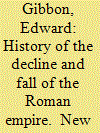

|
|
|
|
|
| Publication |
New Delhi, Alpha Editions, 2016.
|
| Description |
342p.hbk
|
| Contents |
Vol. IV.
|
| Standard Number |
9789386019264
|
|
|
|
|
|
|
|
|
|
|
|
Copies: C:1/I:0,R:1,Q:0
Circulation
| Accession# | Call# | Current Location | Status | Policy | Location |
| 058837 | 937.06/GIB 058837 | Main | On Shelf | Reference books | |
|
|
|
|
| 9 |
ID:
147885


|
|
|
|
|
| Publication |
New Delhi, Alpha Editions, 2016.
|
| Description |
538p.hbk
|
| Contents |
Vol. V.
|
| Standard Number |
9789386019271
|
|
|
|
|
|
|
|
|
|
|
|
Copies: C:1/I:0,R:1,Q:0
Circulation
| Accession# | Call# | Current Location | Status | Policy | Location |
| 058838 | 937.06/GIB 058838 | Main | On Shelf | Reference books | |
|
|
|
|
| 10 |
ID:
147886
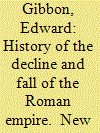

|
|
|
|
|
| Publication |
New Delhi, Alpha Editions, 2016.
|
| Description |
302p.hbk
|
| Contents |
Vol. VI.
|
| Standard Number |
9789386019288
|
|
|
|
|
|
|
|
|
|
|
|
Copies: C:1/I:0,R:1,Q:0
Circulation
| Accession# | Call# | Current Location | Status | Policy | Location |
| 058839 | 937.06/GIB 058839 | Main | On Shelf | Reference books | |
|
|
|
|
| 11 |
ID:
128185


|
|
|
|
|
| Publication |
2014.
|
| Summary/Abstract |
Etymologically 'diaspora' means any people or ethnic population forced or induced to leave their traditional homelands; being dispersed throughout other parts of the world, and the ensuing developments in their dispersal and culture. Historically, the terms 'diaspora' was initially uses by the ancient Greeks to refer to citizen of grand city who migrated to a conquered land with the purpose of colonization to assimilate the territory into the empire. The original meaning was cut off from the present meaning when the old testament was translated to Greek: the word diaspora was used to refer specifically to the populations of Jews exiled from Judea in 586 B C by the Babylonians, and Jerusalem in 136 AD by the Roman empire.
|
|
|
|
|
|
|
|
|
|
|
|
|
|
|
|
| 12 |
ID:
114264
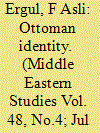

|
|
|
|
|
| Publication |
2012.
|
| Summary/Abstract |
It is awkward for historians to depict a clear-cut portrayal of Ottoman identity. Scholarly analyses by and large lay emphasis on the Islamic and Turkish character of the Ottoman Empire. However, it would be reductionist to evaluate an empire that lasted for six centuries, on three different continents, with solely monolithic ethno-religious tools. A new approach around the term Rum may help to get rid of this reductionism and to understand the sui generis structure of the Ottoman identity. Instead of focusing on ethnic and religious aspects, this novel approach would add both a territorial dimension of Ottoman hegemony and also a social component regarding the relations between the rulers and the ruled. The Rum, with a meaning above Orthodoxy, Greek or Roman Empire, can highlight the ingredients of Ottoman identity and help to overcome the influence of modern nationalist discourses in historical readings.
|
|
|
|
|
|
|
|
|
|
|
|
|
|
|
|
| 13 |
ID:
137894
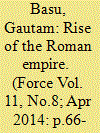

|
|
|
|
|
| Summary/Abstract |
Rome’s history spans 2,500 years which saw its transformation from a small village to the centre of a vast empire that witnessed the founding of Catholicism and left an indelible impact on every aspect of civilisation including, of course, military. Just as the influence of Ancient Rome’s culture, architecture, art and language on human history can never be overstated, so also the lasting impact of its episodic wars on the political map of Europe for centuries. Rome maintained the western World’s first professionally trained permanent army of career soldiers who were equipped, paid and even pensioned by the state, a far cry from the farmer-soldiers of Ancient Greece or the part-time citizen-soldiers of Athens. Ancient Rome was one of the largest and grandest military empires ever.
|
|
|
|
|
|
|
|
|
|
|
|
|
|
|
|
| 14 |
ID:
106888
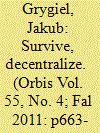

|
|
|
|
|
| Publication |
2011.
|
| Summary/Abstract |
What happens when states or empires face multiple and geographically dispersed assaults along their frontiers from non-state, tribal actors? It is plausible to argue that the result may be state decentralization, both military and administrative. In some cases, this may be a conscious strategy pursued by the central authorities, but in others, it may be the result of centrifugal tendencies pursued by disaffected local leaders. This article illustrates this argument by describing the end of the Roman empire, caused by multiple assaults of barbarian groups. The lesson is that in such an environment a centralized state that arrogates to itself all the functions of security provision may undermine its own safety.
|
|
|
|
|
|
|
|
|
|
|
|
|
|
|
|
| 15 |
ID:
114902


|
|
|
|
|
| Publication |
2012.
|
| Summary/Abstract |
Dr. Zhou Fangyin's 'Equilibrium Analysis of the Tributary System' enriches
the increasingly salient debate among Chinese International Relations (IR)
students on the so-called 'tributary system'
1
in three ways. First, it correctly
points out that China did not unilaterally create the mode of interstate
connections in pre-modern East Asia. Rather, the 'system', if there was
indeed such a thing, was an institutional mechanism mutually constructed
by both the central and peripheral regimes. This, in my opinion, is a crucial
clarification that revises the views of some of the Fairbankian School of
scholars, who insist that the tributary system was an institution enforced
by China on surrounding states that only passively accepted it.
2
Second, the
article differentiates between tributary discourse and practice, and emphasizes the system's internal logic in practical policy making. In another words,
by observing the tributary system as policy-oriented behaviour, the article
rejects the explanation of it as a (partially self-deceived) cultural phenomenon, instead emphasizing its realist significance as a rational political
arrangement. In so doing, it opens the way to further research on the
topic along the political science line.
|
|
|
|
|
|
|
|
|
|
|
|
|
|
|
|
| 16 |
ID:
152552
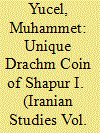

|
|
|
|
|
| Summary/Abstract |
The Sasanian king Shapur I held a ten year series of campaigns against the Roman Empire. Returning to Iran after these campaigns, in order to immortalize his victories he built a series of reliefs and gave broad information in his famous work, Ka’be-ye Zardosht. However, the term he used to define himself in these articles, “King of Kings of Iranians and non-Iranians,” was not used on coins, which has become a subject of discussion. This work aims to clarify such arguments based on a unique drachm belonging to Shapur I which is present in the Elazig Museum of Archaeology and Ethnography.
|
|
|
|
|
|
|
|
|
|
|
|
|
|
|
|
| 17 |
ID:
094974
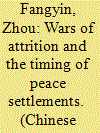

|
|
|
|
|
| Publication |
2010.
|
| Summary/Abstract |
The international war that raged throughout continental Europe from 1618 to 1648 had a profound affected upon almost all European states. Although certain countries showed willingness as early as 1635 to start peace talks, and France, Sweden and the Holy Roman Empire reached a preliminary treaty in 1641, it was not until 1645 that talks were actually initiated. This raises the question, what are the factors that compel belligerents to move towards a peace settlement?
|
|
|
|
|
|
|
|
|
|
|
|
|
|
|
|
|
|
|
|
|